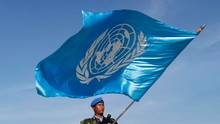The decision to withdraw from the United Nations Convention on Desertification is the latest but regrettably likely not the last move to distance Canada from the world body. There is a disappearing character to contemporary Canadian multilateral diplomacy. Like Lewis Carroll’s Cheshire cat, soon all that may remain of our country at the UN is a grin or, more accurately, a scowl.
Following the Harper government’s failure in 2010 to win a Canadian seat on the UN Security Council, its disregard of the UN gave way to disdain. Ottawa’s rare appearances at the UN have tended to stress what it regards as Canada’s uniquely “principled” foreign policy, bringing to mind U.S. Secretary of State Dean Acheson’s characterization of Canadian foreign policy in the fifties as “the stern voice of the daughter of God,” and cementing Canada’s long-standing reputation as global mother-in-law.
Because of the links between drought, land degradation, desertification and climate change, withdrawal from the Desertification Convention comes with potentially significant costs. Ottawa’s decision reinforces the impression that it does not care about climate change.
Given that the government of Alberta as well as ministers and departments in Ottawa have been going to considerable effort and expense to argue in the U.S. that Canada does care, it is self-harming to hand America’s Keystone opponents a stick to beat the pipeline with.
Also, because the locus of most of the devastation arising from desertification is in Africa, walking away from a treaty whose creation was led by the Mulroney and Chrétien governments reinforces the impression that Ottawa no longer cares about Africa. It is an impression that this government also went to some trouble and expense to try to reverse. Further, because the worst destruction from desertification is happening in the Sahara region, abandoning the treaty sends a mixed signal about the security issues at stake in Mali and the Sahel, and about Canadian mining interests there as well.
There is a larger cost, too, to the UN. The UN is not perfect – it is currently failing the people of Syria, for example – but warts and all it is necessary, and its effectiveness is in our interests. It is the one organization that can convene the whole world (except, these days, Canada) under one roof to deliberate and, when member countries can agree, decide what to do on the major issues of the day (e.g., the Iranian nuclear program and North Korean sanctions).
Further, the member countries of the UN have spawned an extensive body of international law, treaties, norms, practices, innovations and institutions that help members manage most facets of interstate relations. All told, over 500 multilateral treaties have been concluded under UN auspices, making the organization the world’s central operating system, performing the functions accorded to it by its members and generating policy drivers such as the Millennium Development Goals.
None of this neutralizes the exercise of power in international relations but it does constrain and channel power, bringing greater order, predictability and progress to global affairs, and greater modernity, security and dignity to people’s lives.
Before this decade is over, China will overtake the United States as the biggest economy in the world and not long after that it will rival the U.S. as the most powerful country. Its role in global governance will expand apace. Now is the time, as Asian intellectual Kishore Mahbubani and others have observed, for Western countries to reinforce the instruments of global governance, especially the UN, inculcating values and imbedding Western interests into their fabric, the better to protect them later.
To put it bluntly, it is a major mistake to simply write off the institutions our parents and grandparents created, as if the current or next generation would have the wit, wisdom and will to do better. While Canada retreats to the United Nations sidelines, other countries, notably India, Brazil, Germany and Japan, seek larger roles in the organization.
The Desertification Convention is intended to be both preventative and restorative, entailing oversight and monitoring. Its cost to Canada is not large – less than some senators spend on travel, or Ottawa will pay to feed the pandas in Toronto.
If other United Nations members agree with Ottawa that the drought convention’s institutions spend too little of their funds on programing and too much on conference diplomacy, the constructive response is to build an alliance with them to fix the problem. Walking away, on the other hand, leaves just the Cheshire Cat’s scowl to protect Canadian interests.
Paul Heinbecker is a former Canadian ambassador to the United Nations and chief foreign policy advisor to Prime Minister Brian Mulroney. He is currently with Laurier University and the Centre for International Governance Innovation.
It’s not just the drought treaty. Canada is vanishing from the United Nations

Ce n'est pas Vigile qui le dit : le gouvernement Harper creuse la tombe du Canada qu'on connaît

Paul Heinbecker2 articles
a former Canadian ambassador to the United Nations, is a distinguished fellow at the Centre for International Governance Innovation and director of the Laurier University Centre for Global Relations.


























Laissez un commentaire Votre adresse courriel ne sera pas publiée.
Veuillez vous connecter afin de laisser un commentaire.
Aucun commentaire trouvé